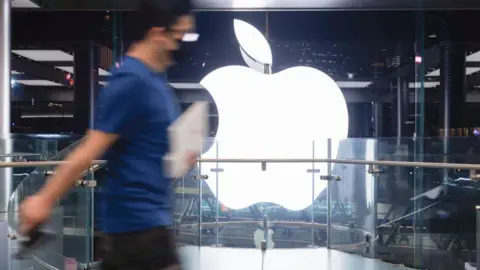
Two US lawmakers have strongly criticized the UK's "dangerous" and "shortsighted" request to access encrypted data stored by Apple users worldwide in its cloud service.
Senator Ron Wyden and Congressman Andy Biggs have written to National Intelligence Director Tulsi Gabbard, stating that this demand threatens the privacy and security of the US.
They urge her to give the UK an ultimatum: "Withdraw this dangerous attack on US cybersecurity, or face serious consequences."
The BBC has reached out to the UK government for comment.
"While the UK has been a trusted ally, the US government must not allow what is essentially a foreign cyberattack carried out through political means," the US politicians wrote.
If the UK does not withdraw, Ms. Gabbard should "reevaluate US-UK cybersecurity arrangements and programs, as well as US intelligence sharing," they suggest.
What is the UK seeking? The request for the data emerged last week.
It applies to all content stored using what Apple calls "Advanced Data Protection" (ADP).
This service uses end-to-end encryption, meaning only the account holder can access the stored data. Apple itself cannot view it.
It is an optional service, and not all users choose to activate it.
The demand was first reported by the Washington Post, citing sources familiar with the matter, and the BBC has spoken to similar contacts.
The Home Office stated: "We do not comment on operational matters, including confirming or denying the existence of any such notices."
Apple declined to comment, but states on its website that it considers privacy a "fundamental human right."
The order has been issued by the Home Office under the Investigatory Powers Act, which requires firms to provide information to law enforcement agencies.
Under the law, the Home Office's demand cannot be made public. Senator Wyden and Congressman Biggs say agreeing to the request would "undermine Americans' privacy rights and expose them to espionage by China, Russia, and other adversaries."
They note that Apple does not create different versions of its encryption software for each country it operates in, so Apple customers in the UK will use the same software as Americans.
"If Apple is forced to create a backdoor in its products, that backdoor will end up in Americans' phones, tablets, and computers, weakening the security of Americans' data, as well as the data of countless federal, state, and local government agencies that trust Apple products with sensitive information."
The UK government's move has surprised experts and alarmed privacy advocates, with Privacy International calling it an "unprecedented attack" on individuals' private data.
However, the US government has previously asked Apple to break its encryption for criminal investigations.
In 2016, Apple resisted a court order to create software that would allow US officials to access the iPhone of a gunman, though this was resolved after the FBI successfully accessed the device.
That same year, the US dropped a similar case after gaining access by discovering the passcode of an alleged drug dealer.
Similar cases have followed, including in 2020, when Apple refused to unlock the iPhones of a man who carried out a mass shooting at a US air base. The FBI later said it had been able to "gain access" to the phones.
